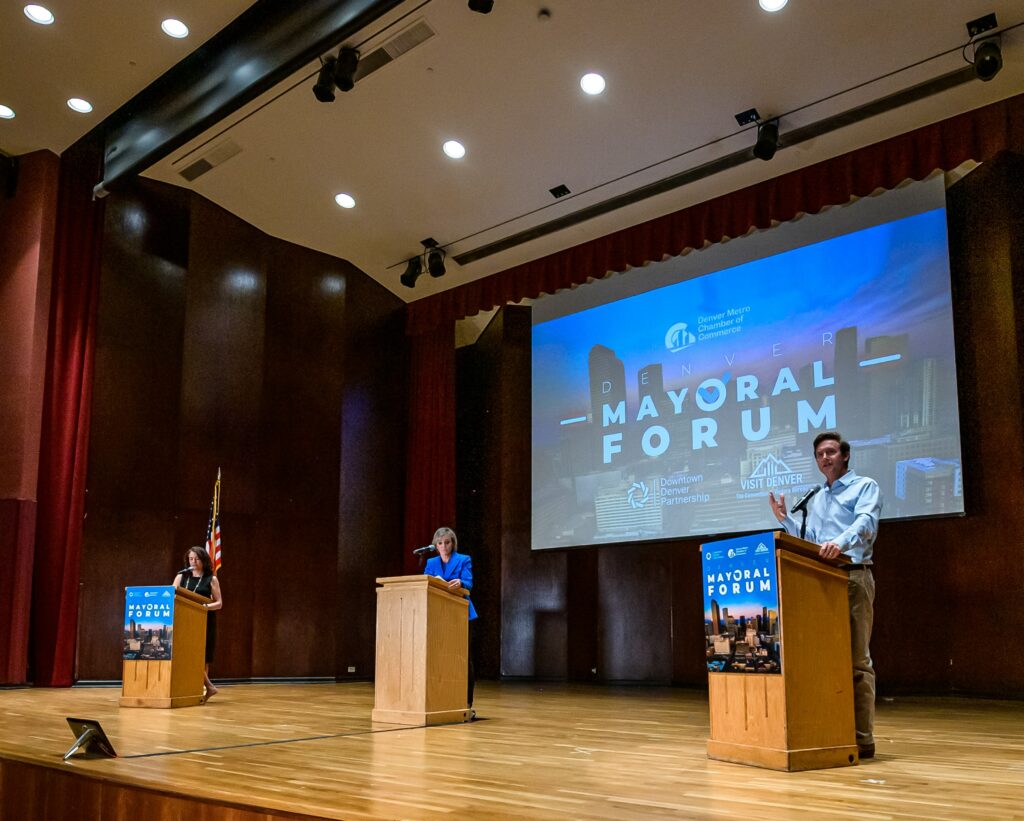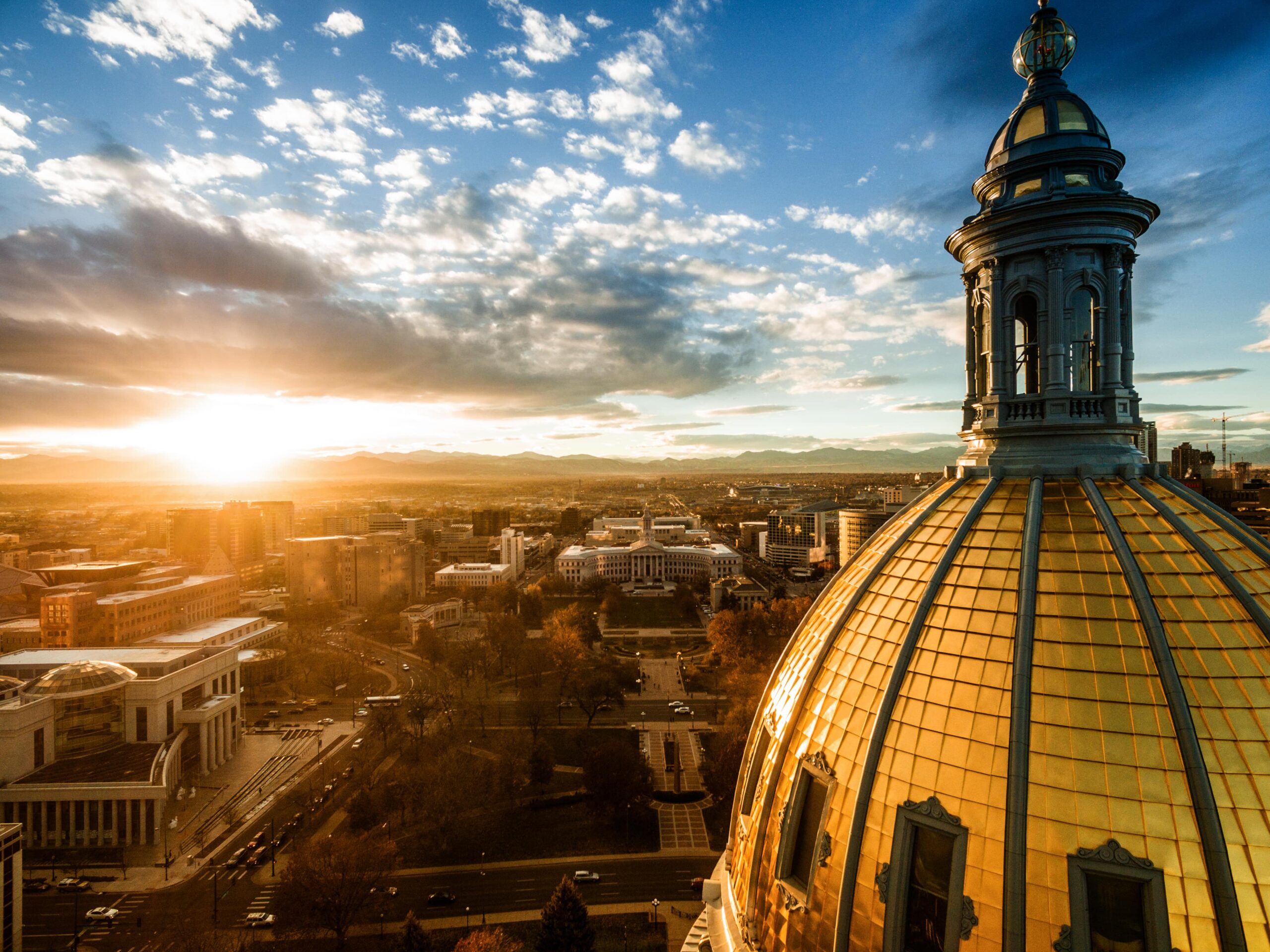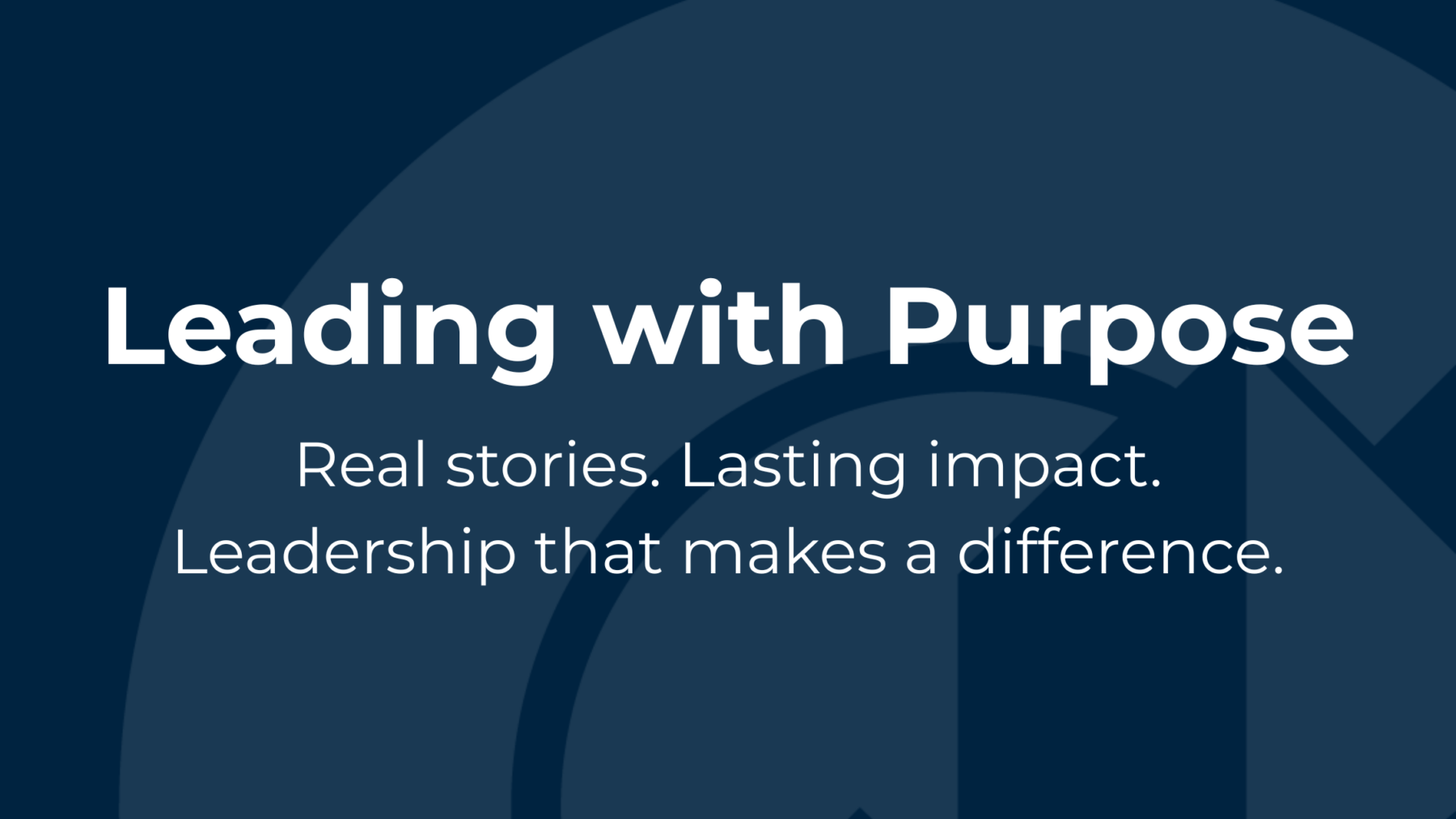Photo provided by Dave Anderson at InSync Photography + Design. View all event photos.
This past Wednesday, the Denver Metro Chamber of Commerce, Downtown Denver Partnership and VISIT DENVER hosted a mayoral forum featuring the two final Mayoral candidates, Kelly Brough and Mike Johnston. The moderator for the evening, Shaun Boyd, political analyst for CBS News Colorado asked candidates about the tough business issues to get a clearer sense of how their leadership would impact Denver’s business community.
The Biggest Take-Aways From the Evening Include:
- Both Brough’s and Johnston’s respective business attraction and retention plans were conditional on the safety of downtown Denver. Candidates were much less specific on their economic development strategy. While safety precedes growth, the city will need a coordinated plan to manage its various economic changes.
- Neither Brough nor Johnston are proponents of safe injection sites. Denver passed a resolution four years ago, stating that if allowed by the state, the city would host a site. If the state legislature passes House Bill 1202 this session, that permission is granted. This could be a point of stress for the new mayor’s substance misuse and safety plans.
- As it relates to substance misuse plans, both candidates are interested in restoring drug courts in Denver. They both argued that drug courts are an important diversionary step that was gutted by the state legislature’s response to the current fentanyl crisis.
- For people experiencing homelessness who are treatment resistant, Brough’s last resort is involuntary detention. Johnston’s last resort is to sweep them out of the Denver area. This was perhaps the biggest point of distinction between the candidates on policy.
- The Park Hill Golf Course will remain a golf course, per the will of the voters. But a larger conversation around transit-oriented density is overdue. It will be essential that the next mayor creates density with community support.
What Stood Out to the Chamber:
Most important infrastructure project:
- Brough
- Denver International Airport
- Johnston
- 16th Street Mall
Most important appointments:
- Brough
- Police Chief
- Chief of Staff
- Department of Housing Stability (HOST)
- Johnston
- Create a new role for a Senior Advisory on Homelessness
- Police Chief
- Department of Housing Stability (HOST)
What set them apart:
- Brough
- Previous executive and public sector experience
- Life story
- Commitment to not running for another office
- Johnston
- Vision
- Track record on abstract problems
- Ability to work with broad coalitions
Ideas That Caught Our Attention
Brough
- The city is approaching a funding cliff as federal pandemic dollars run dry. That cliff could shock the homelessness response systems we currently have in place.
- This will be a significant challenge for the next mayor.
- There needs to be more transparency and accountability from city services. What Denverites can expect from the city should be the foundation of the budget.
- Makes sense to us.
Johnston
- Make it easier for commuters to get downtown by making Eco Passes free.
- We're not sure how it would be funded, but adding foot traffic downtown and increasing RTD's ridership would go a long way toward improving safety.
- The city's homelessness response is not centrally coordinated. It's important to have someone who is working across departments to get results.
- We agree.
Thank you to our media partners for this event, CBS Colorado. You can view the full forum here.
What's New at the Legislature?
- There are 347 bills awaiting action in the Colorado legislature with less than a month left in the session. But this week, work slowed down in the House as Colorado Republicans used stalling tactics during floor debate.
- Senate Bill 213, land use legislation, faces hurdles from local government. Sponsors introduced 52 pages of draft amendments and the bill is far from finished. We expect many more changes to come, but remain committed to strong action in order to deliver housing for Colorado.
- Legislators finished their work on the state budget and sent a $38.5 billion spending plan to the Governor for signature. If approved, the budget will increase state operations by 8.9% next year. Overall, the budget is smaller than it was last year when you take into consideration the federal American Rescue Plan Act dollars the state had to spend in the current fiscal year, which ends June 30.
- Education got some attention in the budget with post-secondary education receiving an increase of $147 million. This is a key investment given Colorado lags peer states when it comes to higher education funding. K-12 education also received an increase of $485 million, raising per-pupil spending by $900.
- Yesterday, House Bill 1294 Pollution Protection Measures, was formally introduced in the Colorado House. The Chamber and a coalition of more than 20 other business organizations submitted a joint letter of opposition to Senate and House leadership, as well as Governor Jared Polis's office, regarding this ozone air permitting legislation.
In Case You Missed It:
It’s been busy at the legislature negotiating, testifying and mobilizing members. Here are some pieces of legislation we’ve been working on that have concluded the legislative process:
- House Bill 1090 Limit Metropolitan District Director Conflicts (Chamber opposed) was postponed indefinitely
- House Bill 1169 Limit Arrest For Low-level Offenses (Chamber opposed) was postponed indefinitely
- Senate Bill 51 Conforming Workforce Development Statutes (Chamber supported) was signed by the Governor
- Senate Bill 110 Transparency For Metropolitan Districts (Chamber supported) was signed by the Governor
There are still some major issues working their way through the General Assembly, including an overhaul of the Colorado Consumer Protection Act, changes to harassment standards, major interventions on rental agreements and prices, land use reform and more.
FAMLI
Due Date: Employers have until April 30 to submit their Q1 2023 wage reports and premium payments to FAMLI. Learn how to submit your wage report here.
What is this again?
The Family and Medical Leave Insurance program was created by Proposition 118 in November of 2020. It creates paid leave benefits for employees for life circumstances that might pull them away from work. Employer and employee contributions have begun with benefits being made available in January 2024.
Bills We Took a Position On
Support
- House Bill 1277 consolidates the composite return and withholding options for nonresident owners and clarifies the calculation.
Amend
- House Bill 1272 enacts many provisions involving taxes related to decarbonization.
Oppose
- Senate Bill 252 requires hospitals to create a public list of all standard charges for all hospital items and services provided to patients.



